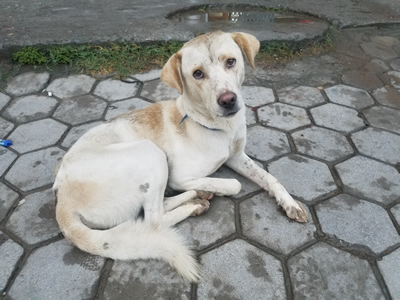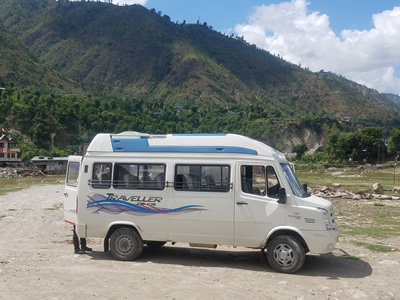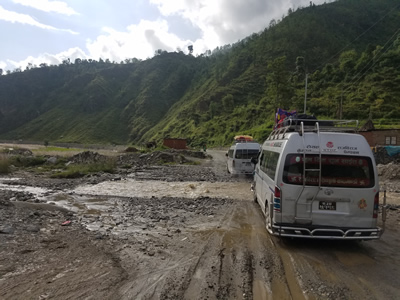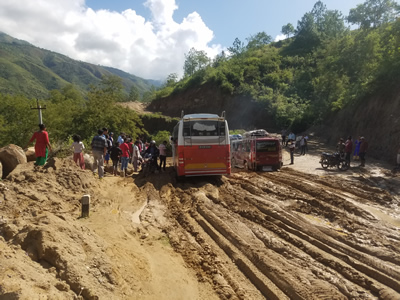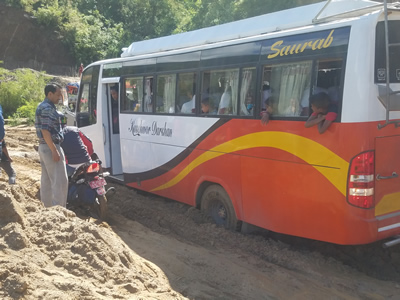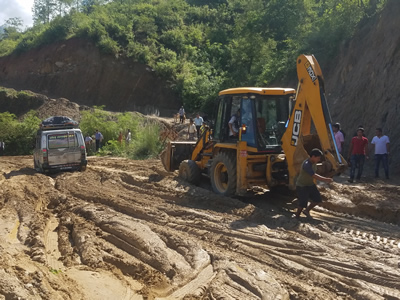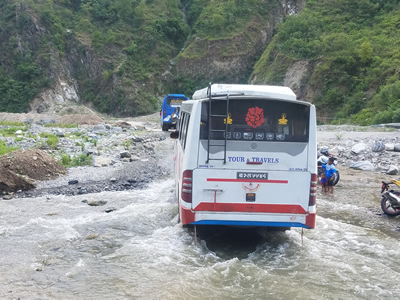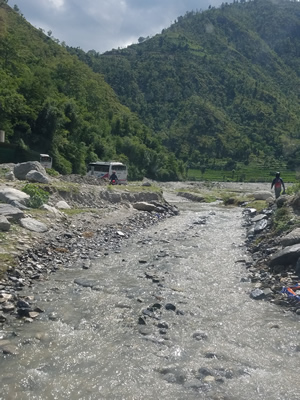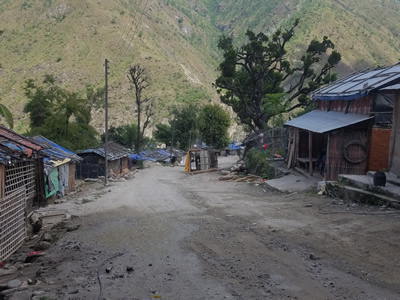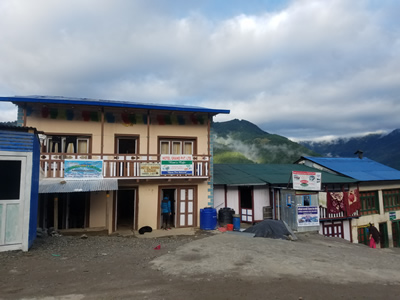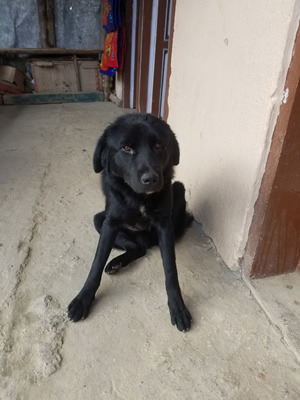Nepal Pt3: The End of the Road
After our flights to Lukla were cancelled I went back to the Kathmandu Guest House. They had been cancelled the day before. They had been cancelled today. The weather did not look good for tomorrow. There was no way to know when flights to Lukla would resume. Even when they did, there was a backlog of passengers whose flights had been cancelled so it might take a while for us to get one. That evening Tasi called me and said that he had booked us on a bus instead per our discussion in the taxi back from the airport. We would play it safe and drive to the trailhead.
Tasi said he would pick me up at 5 am since it was going to be a long ride. That's pretty early but next morning I was ready and waiting in the lobby when he came by. We drove to a large square near the airport that must have served as the city bus station. Although it was still totally dark the place was humming with activity. There were buses and cars and vans and taxis everywhere. People were rushing around, off to work for the day or traveling to other parts of the country. There were vendors and stands selling food or newspapers or anything else you might want. Tasi went off to pay for our tickets while I just hung around. It was a good place for people watching.
And dog watching. With so much going on there were a lot of dogs there, rooting around trying to find something to eat. Most of the dogs in Kathmandu seemed to be feral. In particular I noticed a yellow lab. It was sad to see. She seemed like a really nice dog but she was very thin and didn't look healthy. It was weird. I felt like I was seeing Abby in an alternate universe. I guess both people and dogs are born into the first world or the third world. When I got home I had a long talk with Abby about her dog privilege but it didn't seem to make much of an impression on her.
It was daylight by the time we were ready to go. Our transportation was a Ford Traveler, a nice van that was relatively new. A lot of the vehicles in Nepal look like they are about a hundred years old and held together with duct tape. It had room for fourteen passengers. The night before when Tasi made arrangements there were six other passengers so he bought all eight remaining seats to ensure that we wouldn't be crammed in. I'm sure it was still a lot less expensive than the flight to Lukla.
Tasi suggested that I ride up front with the driver. It was much better for sightseeing since that way I had a good view ahead and all around. As the trip progressed though I found that to be a mixed blessing.
Besides Tasi and I, there was also our porter, Awshuk. He would be carrying my duffel bag on the trek while I got to hike with just a day pack. Since we had bought extra seats, Gajendra's (owner of Himalayan Odyssey Trek Nepal) sister-in-law came with us too. We picked her up shortly after getting started. She was going back to her home in Khumbu after spending the Dashain festival in Kathmandu. With her onboard we headed out of town, taking a road that actually looked like a real highway. It had two lanes going each way and a divider in the center. Of course, I was reminded that we were in Nepal when we had to change out of the center lane because it was blocked by a cow grazing on grass in the center divider. But it was pretty fast and easy driving out of the city.
Soon we were leaving the Kathmandu Valley and climbing up into the foothills of the Himalaya. As we got higher we hit clouds and fog. The road narrowed but was still paved. We were making good time and I didn't see how it was going to take us all day to get to the village of Salleri, where we would spend the night before starting to trek the next day. It didn't look like it was that far on the map. When I got home I checked on google maps and was surprised to see that it is about a hundred and sixty road miles. And I was going to find out that we would make slower progress as we got closer.
After about an hour we stopped at a roadside stand for a fifteen minute break. I was brave enough to use the toilet but not brave enough to have anything to eat. I didn't even get anything to drink since I didn't know how often we would be stopping. Turned out, not very often, so it was a smart move.
Eventually we dropped out of the hills and followed the valley of the Sun Khosi (River of Gold). The river doesn't originate high in the mountains. It comes from the other side of the Himalaya in Tibet. Since the river is older than the mountains, as the land slowly rose the river cut a deep gorge through the new mountain range into Nepal. From where we were driving it continues into India where it eventually flows into the Ganges River. On my first trip to Nepal in 1990, I had trekked along the Bhote Khosi, which is the name used for the upper section of the river where it flows through the Himalaya.
Today it was warm and sunny as we drove along the river. But the drive was starting to get "interesting". There was a lot of traffic - cars, vans, buses, trucks. And motorcycles. Especially motorcycles. In the US, most motorcycles have large engines and usually go racing past cars and trucks. In Nepal they are the vehicle of the poor. Most of the motorcycles were really just scooters or motorbikes with with the smallest engine possible. Most of them were loaded down, with two or even more people riding on them. Some of them had large loads on the back. Our van was the opposite. It had a respectable engine and could go pretty fast, even up steep hills. Our driver was impatient and would follow right behind motorcycles when they held him up. So here would be this whole family on their tiny motorbike, put-putting along. Dad would be driving with mom sitting behind him holding a young child in her arms. Meanwhile we were following in this big van, our bumper just inches behind their rear wheel. I kept thinking we would bump them and knock them over and run over the whole family. When the pavement ended and we were on a rough dirt road it was even worse. At every rock or pot hole in the road I expected a motorcyclist to take a spill right in front of us. Most of the time I couldn't even watch. Somehow we managed to make the whole trip without an accident but I'm sure that very bad ones occur frequently along this road.
At one point we came to a complete stoppage of traffic. Since no cars were coming the other direction I figured that the road had to be completely blocked. I got out and walked ahead to see what the problem was. About a hundred yards ahead of us was a place where water drained across the road. It had turned the road surface into mud that had to be a foot deep. There was a bus that was stuck. And when I say stuck, I mean stuck. It looked like the mud came up to its axles. But the driver refused to give up. He kept rocking back and forth and eventually got some forward momentum and managed to get out. No one else was willing to give it a try after seeing that. It looked like we weren't going to have any more luck getting to the mountains than we had the day before. But Tasi said that "someone was coming". I wasn't sure how anyone was going to help but half an hour later I found out. "Someone" showed up and he was driving a backhoe. In ten minutes he was able to clear about a foot of mud off of the road surface. Not perfect but it looked like the road was passable again. We all piled back in the van and in a few minutes had gotten past the obstacle. With the amount of traffic I suspect the road would be churned into mud again in another half hour or so.
As we continued to drive the road got worse and worse. Soon there were no longer any bridges. Streams just ran right across the road and had to be forded. We drove right through the water. In some places the water didn't run across the road, it ran down the road. We were literally driving in a stream. In Idaho I wouldn't have even called this a 4WD road but here in Nepal it was the main route to and from the Solu Khumbu region and lots of people use it. I was impressed. These Nepalis are tough.
At one point we climbed up a steep hill to reach a village. I think it was called Ghurmi. There was a strong smell and it wasn't pleasant. I noticed that the whole hillside below the village was covered in garbage. Apparently people just walk to the top of the slope and throw their trash down the hill. They had obviously been doing it for a very long time. In town we had to stop at a police checkpoint where they checked out papers. I got out and looked around. It was probably the poorest, dirtiest, dustiest, most unpleasant village I had seen in Nepal. There was even an old tipped over vehicle blocking one side of the road right in the middle of town. Not a nice place. I wouldn't recommend that you put it on your bucket list and it is definitely checked off of mine.
It took a long time for us to get cleared. Since I was a tourist, I suspect that they may have been trying to get a bribe from Tasi. He didn't say anything when he was finally done other than that they had been difficult but he had resolved it. I was glad when we were on our way again.
We crossed the Sun Kosi on the new bridge just below Ghurmi. No fording this river! Before the bridge was completed all traffic had to be ferried across causing long delays. It doubled the time for the whole trip. I was grateful for the bridge. I thought the trip was long enough as it was.
After crossing the river we stopped for lunch at a small restaurant in the village of Harkapur. This was not a tourist town either. Besides our group there were only locals. I didn't really want to eat Nepali food but Tasi insisted that I have something. I ended up ordering just plain rice. That started what became a recurring theme on the trip. Between hard hiking and high altitude I often wasn't very hungry. Besides, I tried to be very cautious about what I was eating. Nepal is a third world country and you can get some nasty bugs from bad food that will give you major stomach trouble. I can attest to that from my experience on previous trips. On the other hand Tasi was always worried that I wasn't eating enough to keep my strenghth up. I never had a problem though. I had plenty of body fat to fall back on. It would take a long time for me to starve.
After lunch we started to climb high into the mountains. Soon the sun was gone. It had clouded up again and it was much cooler. The road was very windy and narrow with a lot of blind curves and impressive dropoffs. I just kept reminding myself that our driver traveled this road often.
At one point we stopped to drop off Gajendra's sister-in-law. There were several people waiting by the road to welcome her home. The timing was amazing because the second that she stepped out of the van it started to rain. Seriously rain. It was an amazing cloud burst. One minute there was nothing and the next minute it was a deluge. All the people there had to have been completely soaked by the time they walked across the road. I asked Tasi how far they had to go and he said it was only a fifteen minute walk. Only.
With the rain pouring down the road turned to sloppy mud again. We descended steeply into another valley where there was a dam with construction work going on. Obviously the road, if you could call it that, had been built to service the hydro project. It had not been built for comfort or convenience. Driving was a challenge. If you went slowly you would get stuck in the mud. If you went fast you risked sliding off the road. There were places where that definitely would have been a bad thing. The last hour was probably the most exiting of the whole trip.
Finally we reached the village of Salleri. I have to admit that it was a relief to get there. It had taken us nine and a half hours to drive from Kathmandu. I was definitely looking forward to walking the next day instead of riding. I couldn't imagine that the driver was just going to stay overnight and then drive back to Kathmandu the next day with a new batch of passengers. And then do the same thing again, day after day. I certainly wouldn't want his job.
Back in 2004, on a climbing trip to Bolivia, I rode a bus to La Paz on the famous Death Road. Replaced in 2009 by a newer, safer road, it had been called the most dangerous road in the world. The trip from Kathmandu to Salleri wasn't as bad as the Death Road but it sure was a solid second place.
The first thing that I did was walk down the street and find a small shop where I bought an umbrella. After seeing the rain this afternoon I thought I better add that piece of equipment to my kit. I got a small collapsible one for a couple of bucks. Tasi laughed because he thought that it was too small to do any good but I didn't want to be carrying a great big umbrella on the trail for the next couple of weeks. We'd see soon enough who was right.
That night we stayed at the Hotel Grand. It wasn't nearly as impressive as the name would imply but it wasn't bad for a teahouse in the Nepali hills. They had a hot shower available but since it was my first night I decided I could wait. They even had a tv in the dining room. The other guests were all Nepalis. The driver of our van was here. There were two Nepali college students who were also starting to trek the next day. And there were a couple of other travelers that I didn't talk to.
There was a black dog who lived in the hotel. He seemed really nice and was very friendly. He quickly became my new best friend. I got upset later when the lady who ran the hotel walked by the dog and smacked it really hard for no good reason. I don't understand why you would keep a dog just to be mean to it. Definitely no tip or good Trip Advisor review for her!
After dinner I was really tired. It had been a wild day and I still hadn't adjusted to the twelve hour time shift. I fell right to sleep. Tomorrow we would start trekking.
